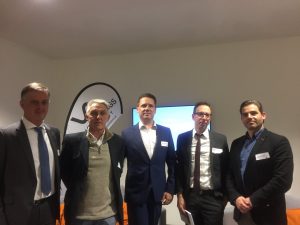 In the last month I had the possibilities to discuss the „insider“ status with insurance managers (CEO`s and leaders from insurance companies). What is their opinion and mindset from the digital transformation?
In the last month I had the possibilities to discuss the „insider“ status with insurance managers (CEO`s and leaders from insurance companies). What is their opinion and mindset from the digital transformation?
I have collected for you my experience with the top 5 five explanations or excuses from insurance CEO’s and leaders, why the digital transformation is not relevant for their insurance company. I realised my mindset, my community, you as my Social Media friends are more motivated to understand and create a new way, new possibilities for the next generation. Sorry for my honestly words, but this is the reallity as well.:-)
Here you can find some insights from the „other world“ of insurance, but as real world as well.
- 1. „digitalisation is not something else than automatisation“ – in the last 5-6 years, I try to motivate the insurance industry, that this „journey“ is not only to buy a software, not only to install artifical intelligence or chatbot, this are more activities. E.g. to find new business models, to create amazing real time processes, marketing campagne and solutions, transforming the organisation and to understand the „exponentional thinking“.
- 2. „we are not interested in digitalisation, because, the IT colleagues -software engineer and data sciences are very expensive, our back office colleagues are cheaper“ – yes, this is true, but as leaders of a company, is this really a vision?
- 3. this topic is related to point 2: „unfortunatly IT colleagues is very difficult to find, because if you are talented, they will found own companies as a startup. Because founding a startup is a hype in our country.“ Of course, because some goverment recover the power of startups from the economic side too.
- 4. „Mrs. Krizsan, I have 3 years to get retired, why should I innovate? My results, premium, profit are going very well. It`s not necessery to change“. But I would ask, do you have the same situation in 10 years as well? Because the decision from today, can make results only some years later (or earlier:-).
- 5. „we don`t want to be „first mover“, because the insurance as a product you can`t protect by patent and we have to check, is the solution good or not. We are in a waiting position“ – yes, this is true as well. But if you want to be in the business tomorrow, you have to be different, you have to do other, creative solutions for your clients.
And, and, and…I could continue the stories, but I don`t want to demotivate you, because you are a future oriented manager with the right mindset about the future of insurance.
Let`s innovate with my personally motto: “the way to create your innovative insurance” See you again at #MOI2021 /hybrid – Vienna and Digital/ at 29-30.09.2021! www.magicofinnovation.eu


